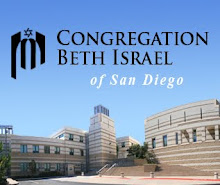Wednesday, February 3, 2010
Exile?
Tonight at CBI Rabbi Berk is speaking on the Babylonian Exile as an outreach program for the San Diego Opera in preparation for the performance of the opera "Nabucco" that takes place during said exile. We were just discussing in his office the question: Are we Jews still in Exile? I need to think about it for a little. What do you, my loyal readers, think?
Subscribe to:
Post Comments (Atom)







The photo is of a relief on an arch in Rome. The relief depicts the triumphant Romans after the destruction of the second Temple. The Babylonian Exile followed the destruction of the first Temple. The juxtaposition of the photo and Rabbi Satz's text serves to remind us that the Jews were driven from Israel, returned, and then driven out again.
ReplyDeleteWe established Modern Israel almost 1,900 years after the destruction of the second Temple, but there is still no third Temple. Do we really want or need to take this step? Jews have advanced on so many fronts since the end of the second Temple. We are not still in Exile.
Reform Judaism, especially, has made our religion and lives more meaningful. Or at least it did until the movement started re-establishing archaic rituals and practices about 35 years ago.
Paul,
ReplyDeleteThank you for the comment. I agree with everything you have said, until you get to the last sentence. What you call "archaic rituals", I assume are rituals such as wearing a tallit, wrapping tefillin, lighting Shabbat candles, keeping kosher, etc. I like to see ritual mitzvot as sacred encounters with the Divine. It is through the practice of ritual mitzvot (and as a Reform rabbi, I know that some work for some people and others don't) that we physically enact our beliefs. Doing something makes it much more concrete than just thinking it. By wrapping tefillin I am binding myself to Torah, the Torah that commands me to seek peace and justice. By keeping kosher I am realizing that what we eat is connected to everything--the evironment, the treatment of workers, the over-indulgent nature of our culture, animal rights. Some rituals have spoken to me differntly at differnt times in my life, and some rituals I cannot participate in like any ritual that I would see as unjust. To paraphrase the late great Rabbi Arnold Jacob Wolf tz'l, we need to ritualize the ethical and ethicize the ritual. Even the Classical Reformers who felt that much of Jewish ritual did not have meaning in their time did not throw out all of ritual. The left open the possibilty that the rituals they threw out could have meaning in our time.
It is fine for those who find meaning by engaging in rituals to do so. I find most rituals to be illogical and an interference with my attempts to make sense of the world through my religion. Current Reform practice makes people think that rituals such as wearing a kipah are the default instead of optional. If I wanted to engage in traditional ritual, I would have joined a Conservative or Orthodox congregation. I wish that others would get a chance to see that they can derive great meaning from Judaism by refraining from traditional practice.
ReplyDelete